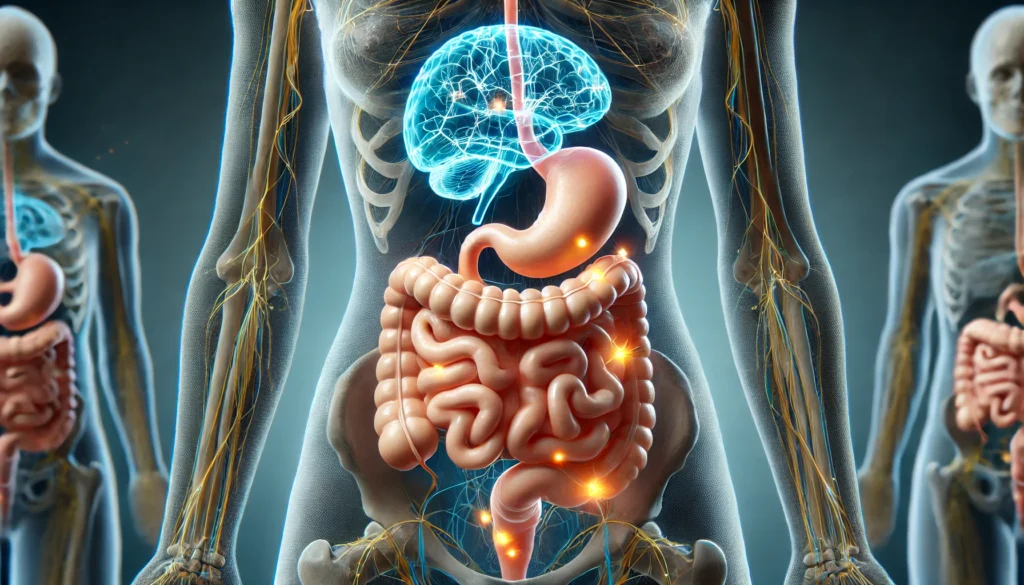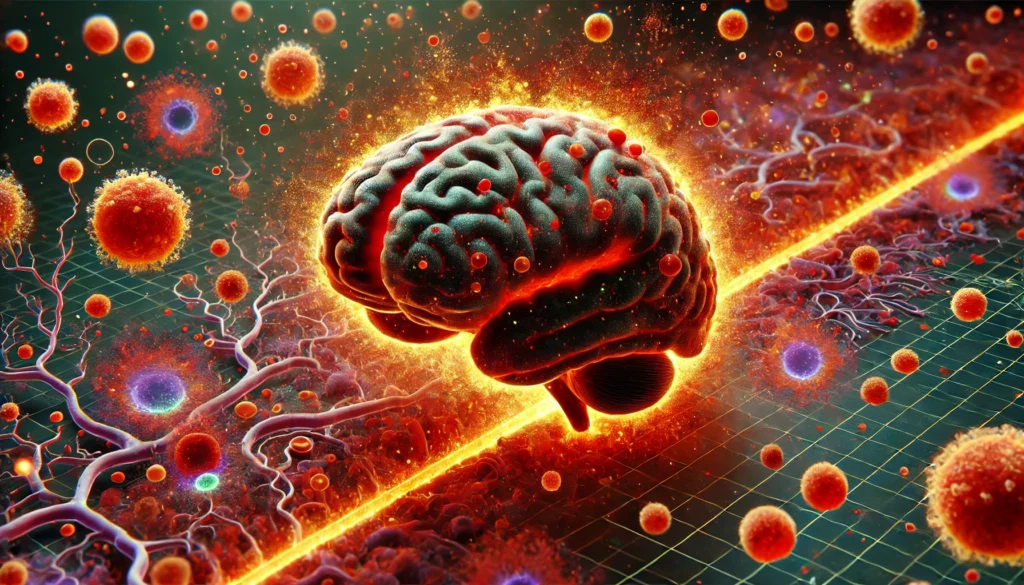Introduction
It’s an increasingly common complaint among health-conscious individuals: “My brain feels hazy after eating food.” The meal might not be overly heavy, and you may have even selected something seemingly healthy, yet within minutes or hours, your cognitive sharpness slips into a fog. Thoughts slow down. Concentration becomes difficult. A simple task feels like mental gymnastics. This frustrating pattern often prompts the deeper question, “Why do I get brain fog after eating?”—and the answer isn’t always straightforward.
You may also like: Do Carbs Cause Brain Fog? What Science Reveals About Carbohydrates and Mental Clarity
Brain fog is not a formal medical diagnosis, but it is a widely recognized term used to describe a state of cognitive dysfunction. Characterized by forgetfulness, poor concentration, mental fatigue, and sluggish thinking, brain fog is often tied to inflammation, metabolic disturbances, gut dysfunction, or hormonal imbalances. When these symptoms appear after meals, it points toward a physiological reaction to food that is affecting brain function. Whether through altered blood sugar levels, food sensitivities, immune responses, or imbalances in neurotransmitter activity, the link between digestion and cognitive clarity is far more profound than many realize.
In recent years, functional medicine and nutritional neuroscience have begun to map out the gut-brain connection in more detail, providing a clearer picture of how what we eat affects how we think. Some people experience a rapid cognitive dip after carbohydrates, others feel dazed following high-fat meals, and still others find that even healthy foods trigger a cascade of mental haziness. This article will explore the physiological and neurological mechanisms behind post-meal brain fog, explain why your brain feels hazy after eating food, and provide science-backed insights into how to restore clarity and cognitive resilience.
If you’ve ever felt mentally sluggish after meals and wondered whether it’s something more than just a “food coma,” you’re not imagining it—and you’re not alone. The science is clear: what happens in your gut doesn’t stay in your gut. It affects your brain. Let’s explore how.

The Brain-Gut Connection: Why What You Eat Impacts How You Think
The human gut is lined with over 100 million neurons, forming what is often referred to as the “second brain.” This enteric nervous system communicates bi-directionally with the brain via the vagus nerve, hormonal pathways, and immune signals. When something goes wrong in the gut—such as inflammation, bacterial imbalance, or poor nutrient absorption—it sends distress signals to the brain. One of the most common manifestations of this distress is cognitive fogginess.
When your brain feels hazy after eating food, it may be due to inflammatory molecules produced in response to certain foods. These molecules, such as cytokines, can cross the blood-brain barrier and interfere with neurotransmitter balance and synaptic plasticity. As a result, you may experience difficulty with memory, focus, and alertness. For individuals with a sensitive gut or a disrupted microbiome, even small amounts of processed foods, allergens, or additives can provoke this inflammatory cascade.
Beyond immune reactions, the gut also affects brain function through nutrient absorption. Many key nutrients essential for neurotransmitter synthesis—including B vitamins, magnesium, zinc, and omega-3 fatty acids—must be properly digested and absorbed. If the digestive process is compromised, or if the meal lacks these nutrients, the brain may be deprived of the raw materials needed to maintain mental clarity.
Additionally, gut bacteria produce several neurotransmitters themselves, including serotonin and GABA. Dysbiosis, or microbial imbalance, can lead to insufficient production of these mood and cognition-regulating chemicals. This connection between the gut and brain creates a physiological basis for why brain fog might arise shortly after eating.

Blood Sugar Dysregulation and Post-Meal Brain Fog
One of the most common reasons people ask, “Why do I get brain fog after eating?” is because of blood sugar swings. After a meal, your body digests carbohydrates and converts them into glucose, which enters the bloodstream. In response, the pancreas releases insulin to help cells absorb the glucose for energy. However, if the carbohydrate load is too high—or if your body is insulin resistant—this process can overshoot, causing a rapid spike followed by a dramatic drop in blood sugar.
This crash, known as reactive hypoglycemia, can leave you feeling dizzy, confused, fatigued, and unable to think clearly. It is particularly common after meals high in refined sugars or processed carbohydrates, but it can also occur in individuals with metabolic syndrome, prediabetes, or even stress-induced cortisol imbalances.
Low blood sugar directly affects the brain because glucose is its primary fuel source. When glucose availability drops too fast or too low, the brain shifts into conservation mode. Neurons fire more slowly, reaction times increase, and executive function—the part of the brain responsible for decision-making and attention—declines. This is one of the fastest-acting mechanisms that explains why your brain feels hazy after eating food.
To manage this, it’s important to balance meals with quality protein, fiber, and healthy fats. These components slow the absorption of glucose and reduce insulin spikes. Stabilizing blood sugar levels throughout the day is one of the most effective ways to reduce post-meal cognitive fog.

Food Sensitivities, Allergies, and Cognitive Side Effects
Food sensitivities—immune reactions that do not involve IgE-mediated allergies—are another common cause of post-meal brain fog. Unlike anaphylactic reactions, these responses may not cause immediate hives or airway restriction. Instead, they provoke subtle but powerful inflammatory responses that affect the brain.
Common culprits include gluten, dairy, soy, corn, eggs, and food additives such as monosodium glutamate (MSG) or artificial sweeteners. When these foods trigger the immune system, cytokines are released and inflammation spreads systemically, sometimes reaching the brain and interfering with neurotransmitter production or mitochondrial function.
Many people with undiagnosed celiac disease or non-celiac gluten sensitivity report that their brain feels hazy after eating food that contains wheat, barley, or rye. The same is true for dairy-sensitive individuals, particularly when consuming casein or A1 beta-casein, a protein found in most commercial milk.
An elimination diet followed by controlled reintroduction can help identify food sensitivities. Blood tests for IgG antibodies, while controversial, may offer clues in some cases. Removing trigger foods can dramatically improve cognitive performance and mental energy for those with sensitivities.
Histamine Intolerance and Brain Fog
Histamine is a compound involved in immune responses, digestion, and neurotransmission. It is also found in many fermented, aged, or processed foods such as wine, cheese, cured meats, and vinegar. Some individuals have a reduced ability to break down histamine due to low levels of the DAO (diamine oxidase) enzyme, leading to a condition known as histamine intolerance.
Symptoms of histamine intolerance can include headaches, flushing, hives, digestive issues, and notably, brain fog. This fogginess often arises after consuming histamine-rich foods and is due to histamine’s role in the central nervous system. It can disrupt the balance between alertness and relaxation and overstimulate certain parts of the brain, leading to confusion, difficulty focusing, and irritability.
For individuals who regularly experience a hazy mind after consuming certain foods or drinks—especially red wine or aged cheese—it may be worthwhile to explore the possibility of histamine intolerance. A low-histamine diet, along with DAO supplementation under medical guidance, may alleviate symptoms.
The Role of Inflammation in Post-Meal Cognitive Fog
Systemic inflammation is a slow-burning fire that erodes cognitive function over time. However, it can also lead to acute symptoms—especially after meals. Inflammatory markers like CRP, IL-6, and TNF-alpha have been linked to impaired memory, reduced processing speed, and mood disturbances. These molecules can pass through the blood-brain barrier, altering brain chemistry and disrupting neuroplasticity.
Meals high in refined carbohydrates, industrial seed oils, and artificial additives can trigger a surge in inflammatory mediators. This process may not always produce overt digestive symptoms, but it can provoke neurological responses such as haziness, lethargy, and mood instability. The repeated experience of mental fogginess after eating is often a clue that inflammation is affecting brain health.
Anti-inflammatory diets rich in omega-3 fatty acids, antioxidants, polyphenols, and phytonutrients can help mitigate this response. Incorporating foods like fatty fish, turmeric, leafy greens, and berries supports both gut and brain health and helps calm the inflammatory cascade that contributes to cognitive fog.
The Blood-Brain Barrier and Postprandial Impairment
The blood-brain barrier (BBB) is a tightly regulated system of endothelial cells that protects the brain from toxins and pathogens. However, it is not impermeable. Certain inflammatory foods, infections, and chronic stress can weaken the integrity of the BBB, allowing inflammatory molecules, microbial metabolites, and even undigested food particles to influence the brain’s delicate environment.
When this barrier is compromised, the neurological impact of what you eat is amplified. A normal inflammatory reaction in the gut may spill over into the brain, provoking symptoms like mental haze, confusion, or disorientation. This is especially true for individuals with autoimmune conditions, metabolic syndrome, or chronic infections.
Supporting BBB integrity involves managing inflammation, maintaining healthy insulin sensitivity, and avoiding dietary triggers. Nutrients like curcumin, resveratrol, vitamin D, and omega-3s have been shown to support BBB function. By protecting this barrier, you help shield the brain from the cognitive chaos that can follow inflammatory meals.
Neurotransmitter Disruption and Cognitive Side Effects
Your brain depends on a precise balance of neurotransmitters to function optimally. These chemicals, including dopamine, serotonin, acetylcholine, and GABA, regulate mood, memory, attention, and learning. What you eat can directly impact the synthesis and function of these neurotransmitters.
Tryptophan, an amino acid found in protein-rich foods, is a precursor to serotonin. Tyrosine contributes to dopamine production. Choline is needed for acetylcholine synthesis. If your diet is deficient in these precursors, or if you experience gut dysbiosis that interferes with absorption, neurotransmitter levels can become suboptimal.
Moreover, certain dietary patterns—especially those high in sugar and processed fats—can desensitize dopamine receptors, reduce serotonin availability, and impair GABA function. This results in mood swings, anxiety, impulsivity, and that all-too-familiar cognitive fog. If your brain feels hazy after eating food regularly, it’s time to evaluate your neurotransmitter support and dietary building blocks.

Mitochondrial Dysfunction and Postprandial Fatigue
The mitochondria are the energy powerhouses of your cells—including your brain cells. When mitochondria are functioning efficiently, they convert nutrients into ATP, the energy currency your neurons need to fire. But when mitochondrial function is impaired, even a modest cognitive demand can become exhausting.
Certain foods, especially those high in sugar or inflammatory oils, can hinder mitochondrial efficiency. Oxidative stress, toxin exposure, and nutrient deficiencies also contribute. When you eat a meal that further depletes your mitochondria—by spiking insulin, introducing oxidants, or increasing inflammation—you may feel a wave of fatigue and mental fog.
Supporting mitochondrial function involves reducing exposure to mitochondrial toxins (like trans fats), consuming antioxidant-rich foods, and ensuring adequate intake of cofactors such as CoQ10, magnesium, B vitamins, and alpha-lipoic acid. Proper mitochondrial support helps explain why some people feel sharp after meals while others feel like they need a nap.
Circadian Timing, Meal Size, and Cognitive Performance
The time of day and size of your meals can also influence how your brain feels postprandially. Large meals, especially those consumed late in the day, can lead to reduced alertness due to blood flow being redirected to the digestive system. Additionally, eating out of sync with your circadian rhythm can impair insulin sensitivity and exacerbate post-meal fatigue.
Circadian rhythms regulate the production of hormones like melatonin and cortisol, both of which affect cognitive function. When meals are mistimed—such as eating heavily late at night—the resulting hormonal misalignment can impair memory, focus, and emotional regulation.
Intermittent fasting and time-restricted eating have been shown to enhance cognitive clarity in some individuals, in part because they reduce postprandial inflammation and stabilize circadian rhythms. If your brain feels hazy after eating food during certain times of the day, adjusting your meal timing might offer relief.
Frequently Asked Questions
1. Why does my brain feel hazy after eating food?
When your brain feels hazy after eating food, it’s often due to blood sugar spikes and crashes, inflammation, food sensitivities, or poor digestion. Meals high in refined carbohydrates can lead to rapid changes in glucose and insulin, which affects the brain’s energy supply. Inflammatory foods can release cytokines that disrupt neurotransmitters and impair cognitive function. Some individuals are sensitive to certain ingredients like gluten, dairy, or food additives, which trigger immune reactions that extend to the brain. Additionally, poor nutrient absorption can lead to neurotransmitter imbalances. All these factors converge to create a feeling of mental fogginess or sluggishness after meals.
2. Why do I get brain fog after eating even healthy foods?
Even healthy foods can trigger brain fog if you have an underlying sensitivity or digestive imbalance. For example, you might be sensitive to eggs, nuts, or certain vegetables like nightshades. High-fiber foods can sometimes ferment excessively in the gut, leading to bloating and inflammation that affects brain function. In other cases, histamine-containing healthy foods like fermented vegetables or aged cheeses may cause symptoms in those with histamine intolerance. It’s also possible that your digestive system is not breaking down these foods effectively due to low stomach acid or enzyme deficiencies, leading to incomplete digestion and brain fog.
3. Can poor digestion cause cognitive fog after meals?
Yes, poor digestion can absolutely cause brain fog. When food is not broken down properly, it can ferment in the gut, feeding harmful bacteria and leading to gas, bloating, and inflammation. This process can increase intestinal permeability, or “leaky gut,” allowing inflammatory molecules to enter the bloodstream and affect the brain. Inadequate digestion also limits your absorption of essential nutrients needed for brain function, such as B vitamins, zinc, and magnesium. Over time, this nutrient depletion contributes to mental fatigue and cognitive decline. Supporting digestion with enzymes, mindful eating, and adequate hydration can make a significant difference.
4. What is the role of insulin in post-meal brain fog?
Insulin plays a crucial role in regulating blood sugar levels after eating. If you consume a meal high in carbohydrates, your body releases insulin to shuttle glucose into cells. However, in people with insulin resistance, this process is impaired. The result is fluctuating blood glucose levels that can lead to mental fogginess, fatigue, and difficulty concentrating. Moreover, insulin affects neurotransmitter activity in the brain, particularly those related to reward and motivation. Chronic high insulin levels can impair these pathways and contribute to cognitive decline. Keeping insulin levels stable through balanced meals and physical activity can help reduce post-meal brain fog.
5. Could leaky gut be causing my brain to feel foggy after eating?
Yes, leaky gut syndrome—where the lining of the small intestine becomes permeable—can allow bacteria, toxins, and undigested food particles to enter the bloodstream. This triggers an immune response and systemic inflammation, which can reach the brain. The resulting neuroinflammation disrupts neurotransmitter production and impairs neuronal communication, leading to symptoms like brain fog, fatigue, and poor memory. Leaky gut is often linked to food sensitivities, chronic stress, NSAID use, and gut infections. Healing the gut with probiotics, glutamine, collagen, and an anti-inflammatory diet can improve both digestive and cognitive health.
6. How can I identify if a specific food is causing brain fog?
The most effective way to identify food triggers is through an elimination diet followed by systematic reintroduction. Remove common irritants—such as gluten, dairy, soy, corn, sugar, and artificial additives—for three to four weeks. Then reintroduce one food at a time, waiting several days between trials, and monitor for symptoms like brain fog, fatigue, headaches, or digestive upset. Journaling can help track patterns. Food sensitivity testing may offer additional insight, though results can vary. Working with a functional medicine practitioner can streamline the process and provide personalized guidance.
7. Can meal size and timing influence post-meal brain fog?
Yes, meal size and timing significantly affect how you feel afterward. Large meals redirect blood flow to the digestive system, which can temporarily reduce cerebral blood flow and contribute to drowsiness and mental haziness. Eating late at night can also disrupt circadian rhythms, impairing insulin sensitivity and cognitive function. Conversely, eating too infrequently or skipping meals can cause low blood sugar, which also leads to brain fog. For most people, smaller, balanced meals eaten at consistent intervals during daylight hours are best for maintaining cognitive clarity and energy.
8. What nutrients support better brain function after eating?
Key nutrients for post-meal cognitive function include omega-3 fatty acids (found in fish and flaxseed), magnesium (in leafy greens and pumpkin seeds), B vitamins (especially B6, B9, and B12), zinc, choline (from eggs and liver), and antioxidants like vitamin C and E. These support neurotransmitter production, energy metabolism, and inflammation control. If your diet is lacking in these nutrients—or if you have trouble absorbing them—your brain may not function optimally after meals. Supplementation under guidance and a nutrient-dense diet can significantly reduce post-meal brain fog.
9. How is the vagus nerve involved in digestive brain fog?
The vagus nerve is a major communication pathway between your gut and brain. When digestion is smooth, the vagus nerve promotes calm and balanced neurotransmitter activity. But if the digestive process is inflamed or disrupted—due to stress, poor food choices, or microbial imbalance—it sends distress signals that affect the brain. These signals can cause fatigue, low mood, anxiety, or brain fog. Stimulating the vagus nerve through deep breathing, humming, cold exposure, and meditation can improve both digestion and mental clarity.
10. What are the best ways to stop brain fog after eating?
To reduce or eliminate brain fog after meals, start by identifying and removing trigger foods. Stabilize blood sugar with balanced meals that include fiber, protein, and healthy fats. Support digestion with mindful eating, digestive enzymes, and probiotic foods. Address any nutrient deficiencies with a tailored diet and supplements. Practice good sleep hygiene and manage stress with relaxation techniques. Time meals to align with your body’s natural rhythms, and avoid heavy or inflammatory foods late at night. Working with a knowledgeable healthcare provider can help uncover root causes and create a sustainable recovery plan.

Conclusion
If your brain feels hazy after eating food or you find yourself asking “Why do I get brain fog after eating?”—you’re tapping into a deeper truth about the body-brain connection. Cognitive clarity isn’t just influenced by how much you slept or how stressed you are; it’s profoundly shaped by what you eat, when you eat, how your body processes it, and how well your internal systems are functioning. What we often write off as simple “food coma” or post-lunch drowsiness may in fact be an alarm bell for metabolic dysfunction, inflammation, poor digestion, or neurological sensitivity.
Fortunately, understanding the underlying biology gives you the power to change the outcome. By stabilizing blood sugar, identifying food sensitivities, healing your gut, supporting neurotransmitters, and respecting your circadian rhythm, you can lift the veil of post-meal brain fog and rediscover the focus, energy, and cognitive sharpness you deserve. You
don’t have to live in a haze. With the right tools and knowledge, your brain can thrive after meals—just as nature intended.
Was this article helpful? Don’t let it stop with you. Share it right now with someone who needs to see it—whether it’s a friend, a colleague, or your whole network. And if staying ahead on this topic matters to you, subscribe to this publication for the most up-to-date information. You’ll get the latest insights delivered straight to you—no searching, no missing out.
Further Reading:
Confusion and Fatigue: What Science Says About the Hidden Causes and Health Risks
Brain Is Mush Meaning: Understanding Cognitive Fog, Burnout, and Mental Exhaustion



